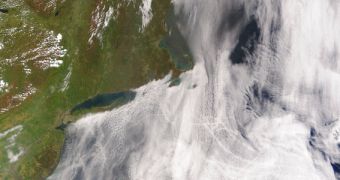Today, March 31, the United Nations' Intergovernmental Panel on Climate Change (IPCC) has released its latest annual, climate impact report, which provides a diagonal view through the state of our planet with respect to global warming, climate change, and the effects these phenomena entail. The conclusion of the document is that global warming is happening now, and much faster than we thought.
In addition to warming up the atmosphere and acidifying Earth's oceans, this process is starting to directly affect both the lives and livelihoods of people around the world, as well as endanger species living in some of our planet's more sensitive and frail ecosystems. The 2014 IPCC report offers the clearest evidence to date to support all of these hypotheses.
The report opens by saying that the effects of climate change are now being felt across all continents and oceans. In previous instances of the document, some areas that had not yet been affected by these changes were listed, but their number declined massively last year, suggesting that the underlying phenomenon is growing in intensity.
The paper is entitled Climate Change 2014: Impacts, Adaptation, and Vulnerability, and was produced by the IPCC's Working Group II. This study features 309 coordinating lead authors, lead authors and review editors, hailing from 70 countries around the world. Some 436 contributing authors and 1,729 expert and government reviewers were involved with putting this work together.
“We live in an era of man-made climate change. In many cases, we are not prepared for the climate-related risks that we already face. Investments in better preparation can pay dividends both for the present and for the future,” commented the Co-Chair of Working Group II, Vicente Barros.
Chris Field, also a co-chair of Working Group II, says that this document highlights the two main avenues that humanity is faced with today: change from using fossil fuels to alternative forms of energy and invest in innovation, or stick with burning oil, coal and natural gas, and face the climate consequences.
“Climate-change adaptation is not an exotic agenda that has never been tried. Governments, firms, and communities around the world are building experience with adaptation. This experience forms a starting point for bolder, more ambitious adaptations that will be important as climate and society continue to change,” he said.
“The report makes it clear that we still have time to act. We can limit climate instability and adapt to some of the changes we see now. But without immediate and specific action, we are in danger of going far beyond the limits of adaptation,” commented the leader of the Global Climate & Energy Initiative at the WWF, Samantha Smith.
Despite efforts by scientists around the world to sway public policy in favor of change, the gap between what science knows for a fact and what governments around the world are doing about it remains massive, and has been unchanged for 20 years.
“The Working Group II report is another important step forward in our understanding of how to reduce and manage the risks of climate change. Along with the reports from Working Group I and Working Group III, it provides a conceptual map of not only the essential features of the climate challenge but the options for solutions,” added the Chair of the IPCC, Rajendra Pachauri.
See the full report here.

 14 DAY TRIAL //
14 DAY TRIAL //